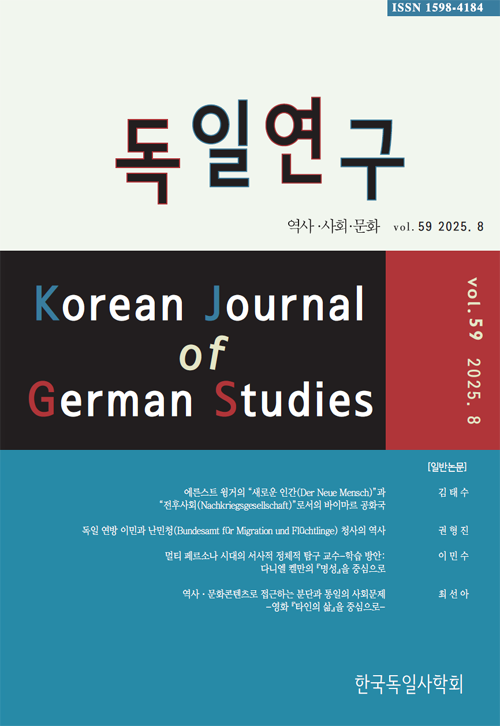학술논문
에른스트 윙거의 “새로운 인간(Der Neue Mensch)”과 “전후사회(Nachkriegsgesellschaft)”로서의 바이마르 공화국
이용수 0
- 영문명
- Ernst Jünger’s “New Man” and the Weimar Republic as a “Post-war Society”
- 발행기관
- 한국독일사학회
- 저자명
- 김태수(Taesoo Kim)
- 간행물 정보
- 『독일연구』Vol.59, 5~40쪽, 전체 36쪽
- 주제분류
- 인문학 > 역사학
- 파일형태
- 발행일자
- 2025.08.31
7,120원
구매일시로부터 72시간 이내에 다운로드 가능합니다.
이 학술논문 정보는 (주)교보문고와 각 발행기관 사이에 저작물 이용 계약이 체결된 것으로, 교보문고를 통해 제공되고 있습니다.

국문 초록
본 논문은 에른스트 윙거(Ernst Jünger)가 제1차 세계대전에서의 체험을 바탕으로 구상한 “새로운 인간(Der Neue Mensch)” 개념을 분석하고, 이를 통해 그의 사유가 바이마르 공화국을 “전후사회(Nachkriegsgesellschaft)”로 이해하는 틀과 어떻게 연결될 수 있는지를 고찰한다. 윙거는 전쟁을 단순한 파괴와 비극의 현장으로 보지 않았다. 전쟁은 인간의 인격을 시험하고 형성해 내는 ‘학교’이자 ‘모험’의 장으로 인식되었으며, 윙거는 자신의 체험을 바탕으로 독자적인 윤리와 행동양식을 가지는 새로운 인간상을 제시했다. 그에 따르면 새로운 인간은 자신의 목숨을 기꺼이 내놓는 용기와 폭력을 사용해 적을 죽일 단호함뿐만 아니라, 기술의 압도적 위력을 자각하면서도 이를 이해하고 통제하려는 태도까지 갖춘 존재였다.
그러나 윙거의 전쟁 일기와 초기 작품까지만 해도 이러한 새로운 인간 개념에서 강력한 민족주의적 요소를 찾아보기는 어렵다. 이 시기 윙거는 오히려 독일 제국과 민족주의에 강한 거부감을 드러냈다. 이러한 입장은 1920년대 후반에 들어서야 변화하기 시작했다. 이 시기 들어 윙거는 전쟁을 통해 탄생한 새로운 인간이야말로 미래 독일 민족의 담지자라고 주장하게 된다. 전쟁 중 경험한 폭력은 이제 외부의 적을 넘어 바이마르 공화국 내의 민주주의와 자유주의에 대항하는 투쟁의 도구로 기능했다.
본 논문은 윙거의 새로운 인간 개념이 단순한 문학적 서술에 그치지 않고 바이마르 공화국이라는 체제 자체에 실존적 위협을 가하는 하나의 정치적 세계관으로 작용했음을 밝힌다. 윙거가 구상한 새로운 인간상은 그를 중심으로 한 “민족혁명파(Nationalrevolutionäre)”를 축으로 큰 반향을 일으켰으며, 그들이 주창한 ‘새로운 민족주의’의 핵심적 기반으로 작용했다. 결국 윙거의 새로운 인간 개념은 단순한 문학적 사유를 넘어, 전후사회로서의 바이마르 공화국을 이해하는 데 중요한 실마리를 제공한다.
영문 초록
This article analyses Ernst Jünger’s concept of the “New Man” (Der Neue Mensch), developed through his experience of the First World War, and examines how this notion can be situated within the interpretive framework of the Weimar Republic as a “post-war society” (Nachkriegsgesellschaft). War did not merely signify destruction and tragedy for Jünger; rather, he perceived it as a kind of “school” in which adventures occurred and human character was newly forged. The New Man, emerging from this school, embodied a unique ethical and behavioral code, distinct from that of ordinary men. According to Jünger, the New Man was not only willing to risk his own life and kill his enemies without hesitation; he was also capable of recognizing the overwhelming power of modern technology, which he sought to master.
Nonetheless, it is historically significant that Jünger’s war diaries and early post-war writings revealed little admiration for nationalism. At the time, he expressed a strong aversion to the German Empire and nationalism. It was only after the mid 1920s that he began to reinterpret his own idea of the New Man in the context of nationalism. From this point on, he argued that the New Man, born out of war, should serve as the bearer of a new German nationalism. Violence, a key motif in his thought, functioned not only as a means of struggle against external enemies, but also against internal adversaries - namely, the democracy and liberalism of the Weimar Republic.
This article thus argues that Jünger’s concept of the New Man did not remain a literary construct, but rather that it served as a political worldview that posed fundamental threats to the republic. His idea resonated especially strongly among the so-called “National Revolutionaries” (Nationalrevolutionäre) and became a central element of their new nationalism. In this sense, Jünger’s concept of the New Man contributes to understanding the Weimar Republic as a society profoundly shaped by the experience of the First World War.
목차
Ⅰ. 서론
Ⅱ. 윙거의 제1차 세계대전 체험과 전쟁 일기
Ⅲ. “새로운 인간”의 탄생
Ⅳ. “새로운 인간”과 민족주의: 윙거의 민족주의적 전회
Ⅴ. 결론
참고문헌
키워드
해당간행물 수록 논문
참고문헌
교보eBook 첫 방문을 환영 합니다!

신규가입 혜택 지급이 완료 되었습니다.
바로 사용 가능한 교보e캐시 1,000원 (유효기간 7일)
지금 바로 교보eBook의 다양한 콘텐츠를 이용해 보세요!



